Hung Yen is a province in the Red River Delta with favorable location and transport conditions for the exchange and development of economy, culture and society. Hung Yen is the home to rice fields, gardens, lotus ponds and famous specialties such as sweet orange, and logan... Also, Hung Yen is the hometown of the great famous celebrities including Hai Thuong Lan Ong, General Pham Ngu Lao, late General Secretary Nguyen Van Linh and President Ho Chi Minh's mother.
Along with thousand years of history of building and defending the country, Hung Yen becomes a scared land as well as the hometown of may entrepreneurs, national heroes in the fields of economics, politics, culture and society; such as Pham Bach Ho, Do The Dien, Pham Ngu Lao, Nguyen Trung Ngan, Le Nhu Ho, Doan Thi Diem, Le Huu Trac, Nguyen Thien Thuat, Hoang Hoa Tham, To Hieu, General Secretary Nguyen Van Linh, and so on.
Throughout the historic periods, ancient forebears have left in Hung Yen thousands of valuable relics. Those are architectural works: temples, pagodas, communal houses, shrines, tombs, etc., cultural historical relics as Da Hoa temple, Da Trach temple associated with the legend Chu Dong Tu - Tien Dung princess, one of the Four Vietnamese Immortals, Ung temple worshiping General Pham Ngu Lao, especially the Pho Hien relic complex proving a prosperous period of Pho Hien - Hung Yen.
As a provincial culture, Hung Yen now preserves thousands of value relics. Currently, the province still keeps 1210 relics, of which 158 national relics and 57 provincial relics. These are valuable assets, the core of the national cultural identity and the pride of Hung Yen people.
Hung Yen situates in the center of North Delta, in the northern key economic region. Hung Yen terrain consists of low hills interspersed plain, excludes mountain, forest and sea. The uneven altitude land formed the strips, zones, alternating high and low areas like wave. As the gateway to the east of Hanoi, there are 23km Highway 5A and 20km railway Hanoi - Haiphong passing Hung Yen. Hung Yen is close to Haiphong seaport, Cai Lan seaport and Noi Bai International Airport, borders with Hanoi, Bac Ninh, Ha Tay, Ha Nam, Thai Binh and Hai Duong. Located in the humid sub-tropical climate, Hung Yen climate is divided into 4 distinct seasons: warm spring, hot summer, mild autumn, cool winter. The average temperature ranges from 22 - 230C, the humidity is 80 - 90%. The rainy season lasts from April to October every year. The rainfall in the rainy season accounts for 70% of the total rainfall.
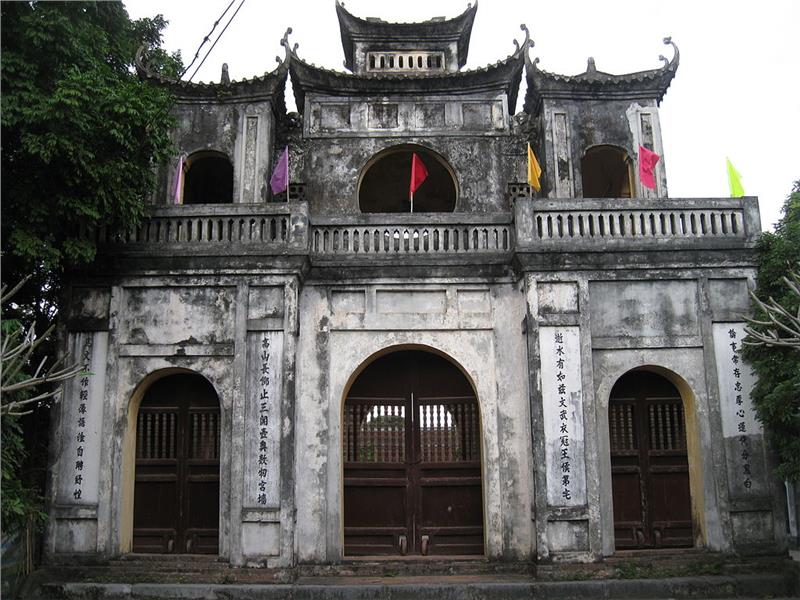
During the Le Dynasty, Hung Yen belonged to Son Nam area. Under the 2nd Canh Hung (1741), Son Nam was divided into Son Nam Thuong and Son Nam Ha. During the Nguyen Dynasty, Son Nam Thuong was renamed into Son Nam, and Son Nam Ha into Nam Dinh. The Nguyen Dynasty implemented administrative reforms in 1831 to dismantle the "tran" administrative units and establish provinces. Hung Yen province was established from 5 districts Dong Yen, Kim Dong, Thien Thi, Tien Lu, and Phu Dung of Son Nam and three districts Than Khe Hung Nhan, Duyen Ha of Nam Dinh. On January 27th, 1968, Hung Yen was merged Hai Duong into Hai Hung. On November 6, 1996, the National Assembly approved the division of Hai Hung into Hai Duong and Hung Yen. After that, the unified districts were split as the former administrative units.
According to population census 2009, Hung Yen population has 1.128.702 people with the population density of 1223 people/km². The percentage of population engaged in agriculture was very high, estimated at 80 - 90%. However, recently, this rate changes quickly due to the development of industry and service. Like in most of provinces and cities in Vietnam, Kinh ethnic people covers majority of population in Hung Yen, therefore the official language of the province is Vietnamese.
Hung Yen province is divided into 10 administrative units, including Hung Yen City and 9 districts: An Thi, Khoai Chau, Kim Dong, My Hao, Phu Cu, Tien Lu, Van Giang, Van Lam, Yen My. Refering to Hung Yen admistration, Hung Yen People's Council is directly selected by citizens. This is the agency of state power in the province. People's Committee of District is the executive body of the People's Council and state administrative agencies in the districts, which is responsible for implementation of the Constitution and law, documents of Vietnam Government and conference decisions of the municipal People's Council.
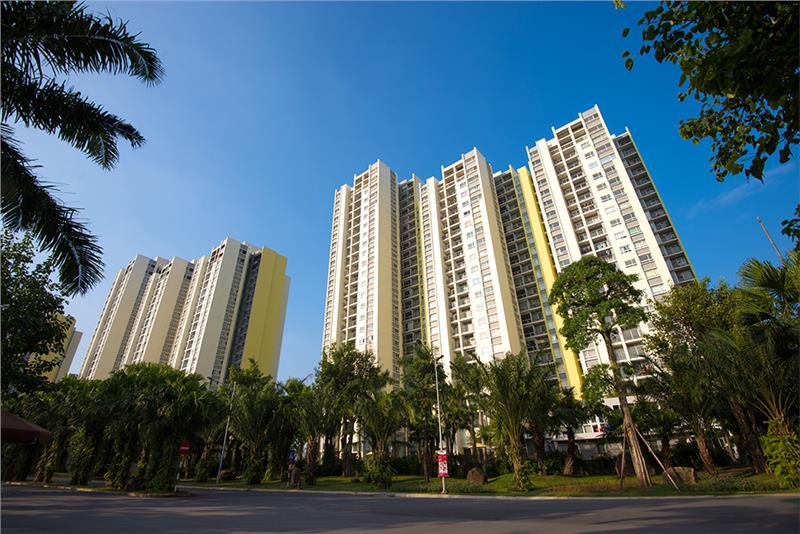
Thanks to the favorable geographical conditions, the National Highway No.5 connecting Hanoi - Haiphong passing the province, in the northern economic triangle, Hung Yen economy has many advantages to develop industry and service. In 2009, despite the world economy crises, GDP of Hung Yen still increased by 7.01%.
Currently, Hung Yen is a province with the fastest and most powerful growing industry of the North Vietnam. There are many large industrial zones such as Pho Noi A, Pho Noi B (textile industrial zones), Thang Long II industrial zone (Mitsutomo), Nhu Quynh, Minh Duc, Kim Dong, so on. Industrial products of the province are textiles, footwear, automobiles, motorcycles, food industry. The economic structure shifts towards industry and service.
Currently, there are many new urban areas built with a modern and civilized planning as Ecopark (Van Giang), Pho Noi B, overseas Vietnamese area, Pho Hien (Hung Yen city and Tien Lu district). Pho Noi (Ban Yen Nhan town) in My Hao district is a regional economic development, the center of business, finance, trade and industry of Hung Yen province. It is also home to a large number of educational institutions such as Hung Yen University of Technology and Education (Base II), Chu Van An university, and Hung Yen Industrial College.
The province continues implementing the program "Comprehensive and basic innovation in education and training", improve the quality of health care service, promoting the propaganda activities of culture, arts, sports, of political tasks, anniversaries, holidays of the country and the province. Continues to promote the program of "Gratitude", "Child Protection", and poverty reduction, through these programs and projects to support poor households and reduce the rate of poverty down to 3.2%.
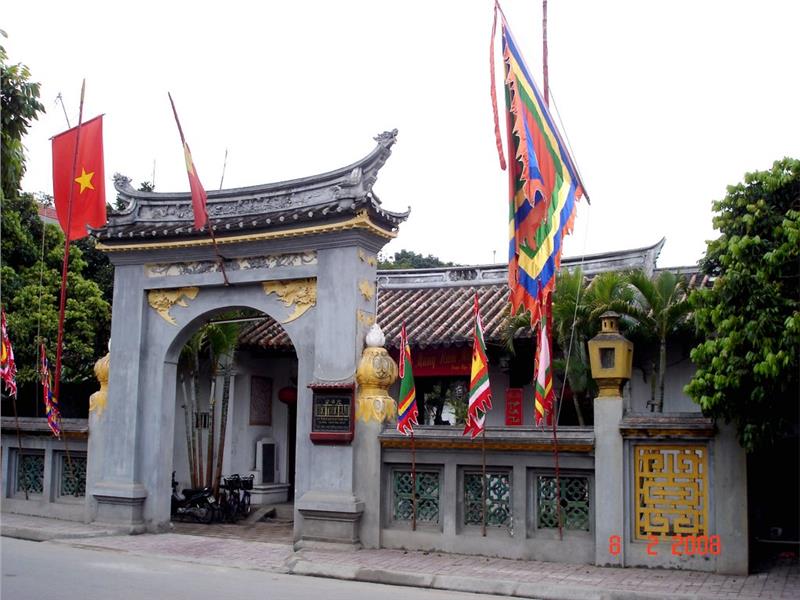
Residents of Hung Yen are mainly farmers. Wet rice is the main crop in association with the Red River Delta civilization, so Hung Yen culture is the wet rice civilization and culture of the Red River. Regarding Vietnam folklore, besides the general folklore in Northern Vietnam, particular ones that only are found in Hung Yen are Trong Quan Singing - a popular singing in Hung Yen, Cheo singing, A Dao singing associated with many cultural historical relics such as Pho Hien, Da Hoa Da Trach relics associated with the legend of Chu Dong Tu - Tien Dung. Pho Hien, Da Hoa Da Trach relic. Moreover, Hung Yen is the hometown of many brilliant characters and national heroes.
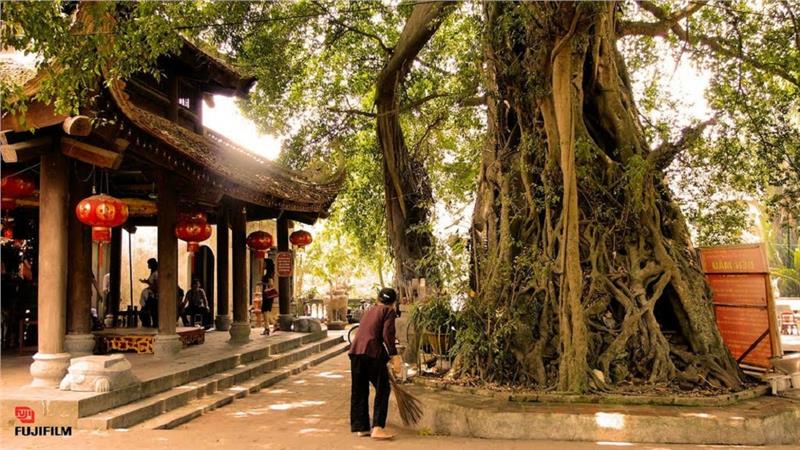
Pho Hien was the most bustling trading port in the 13th - 17th century. It consists of relics in Hung Yen city and a part of districts Tien Lu and Kim Dong. This relic complex is located on Red River bank, the center of politics, economy, culture of Hung Yen in the past and the present. With beautiful landscapes and the variety of cultural historical relics, Pho Hien was formed by the rich customs and habits of Chinese, Japanese and European. Typical architecture of temple and pagoda in Pho Hien relic complex is Literature Temple, Pho Pagoda, Chuong Pagoda, Tran Temple, Mau Temple and May Temple.
Hien Pagoda (Tran dynasty) is located in Hong Chau ward, Hung Yen town. Legend has it that the pagoda was built under the Tran Dynasty by To Hien Thanh - a mandarin of Ly dynasty. Chinese name of Hien Pagoda is "Thien Ung Tu" following the dateThien Ung of King Tran Thai Tong (1232 - 1250). It is also famous for the longan tree in front of the pagoda gate. Previously, the fruits of this tree were picked to offer the kings, Buddha and Tutelary God. So, it is considered as the symbol of Hung Yen.
Mother Temple is considered as one of the most beautiful scenery in Pho Hien. Fron of the temple is Ban Nguyet Lake, one side is Nguyet Ho Street, and another side is Dai Ha Dyke. The temple is known for green 800-year-old trees in front of the temple's gate. Xich Dang Literature Temple is located on a 4000-square-meter wide land in Xich Dang commune, Lam Son ward. The most precious artifacts of Van Mieu are 9 steles enrolled academics. Van Mieu is the vestige demonstrating the traditional fondness for learning of Hung Yen people.
Da Hoa - Da Trach, Ham Tu - Bai Say is relic complex located next to Red River with the beautiful landscapes and pure air. These relics are associated with the legend and festival Chu Dong Tu - Tien Dung and ranked as one of the important national cultural historical relics. From here, tourists can visit rural ecological landscapes - Red River beach, garden village, Xuan Quan pottery village. Visiting Hung Yen, tourists have also the opportunity to enjoy local specialties such as logan in Pho Hien, Dong Tao chicken (Dong Tao - Khoai Chau), lotus Ne Chau' tuong Ban (Ban sauce), braised frog Phuong Tuong (Tien Lu), so on.
Festivals
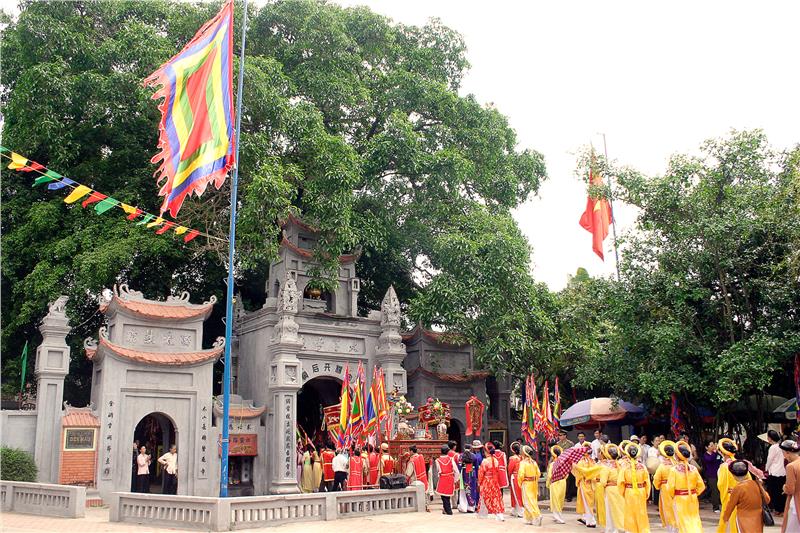
The unique features of many traditional festivals in Hung Yen are often associated with the procession as carnival Red River Mau Temple, Da Trach temple and Da Hoa temple. Being a plain province associated with the wet rice civilization, Hung Yen festivals not only reflect quite clearly people, traditions and customs but also express the gratitude to the heaven, water god and pray for a prosperous life, happiness, thank those who have merits and commemorate the heroes. The unique features of many traditional festivals in Hung Yen are often processions associated with Red River such as festivals in Mother Temple, Da Trach temple, Da Hoa temple, etc.
Hoa Da Trach festival takes place from 10th February to 12th February of the lunar month. During the festival, there are many folk games such as cock flighting, wrestling, trapeze, so on. Along with that, tourists can enjoy traditional art forms as Ca Tru, A Dao, love duets, Hat Van, Quan Ho, dragon dance. Traditional festival in Phu Ung temple has become a beauty in the spiritual and cultural life of people in Phu Ung (An Thi) in particular and in Hung Yen in general. Through the ups and downs, the temple has been preserved and restored. In 1988, Phu Ung temple worshiping General Pham Ngu Lao was recognized as national cultural historical relics.
